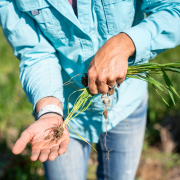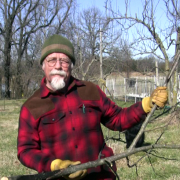Young and Beginning Farmers Come Together
A Recap of the Young Farmer National Leadership Convergence
By Luke Freeman, NCAT Horticulture Specialist
Photo at right: Luke enjoying the Colorado snow!
In November I attended the National Leadership Convergence in Boulder, Colorado, hosted by the National Young Farmers Coalition (NYFC). This was a fantastic opportunity to meet other young farmer leaders from across the country and learn about the common issues young and beginning farmers face. This post is long overdue, but I wanted to share some of my thoughts and experiences from the Convergence. I also wanted to share some ideas on how to support beginning farmers.
This was the fifth Annual National Leadership Convergence. The event brought 120 farmers and 19 NYFC staff members together from across the country. It was truly amazing to see a diverse group of so many young farmer leaders in one place. The group represented over half of the states in the union. I have been involved with the Arkansas Young Farmers Coalition since 2017 and was happy to meet other chapter members from other states in the Southeast – Louisiana, Tennessee, Georgia, and North Carolina.
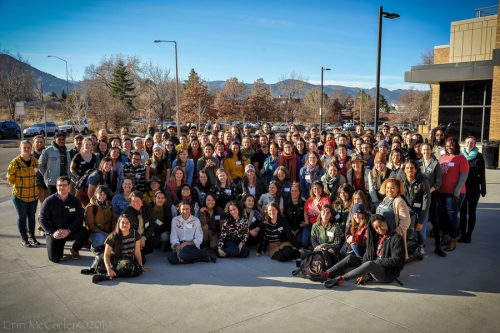
Young farmer leaders from across the country gathered in Boulder, CO. Photo by Erin McCarley, 2019.
Acknowledging the Past, Focusing on the Future
Ricardo Salvador from the Union of Concerned Scientists gave a powerful keynote address, “Why the Future of Food and Agriculture Cannot Resemble the History of Food and Agriculture.” He described how the history of agriculture in the United States is stained by injustice and exploitation. But he returned to this message: We cannot make decisions about the past – only the future.
Salvador explained the economics principle that the factors of production include land, labor, and capital; those who own or have access to these resources accumulate wealth. The history of agriculture in America is littered with examples of land being forcibly taken from indigenous people groups. Labor has been appropriated through slavery or exploited through immigration policies. Access to capital has been denied to communities of color. These uncomfortable aspects of our history have caused disparities in wealth accumulation and land ownership, resulting in unequal opportunities for young people who wish to farm.

Ricardo Salvador from the Union of Concerned Scientists delivering the keynote. Photo by Erin McCarley, 2019.
Salvador emphasized that if we wish to create an equitable food system we must perform agriculture differently going forward. Applying this framework to the next generation of farmers means we would insure that beginning farmers have access to land, that they receive fair compensation for their labor, and that they can access capital. I’ve interacted with many young and aspiring farmers. I can confirm that access to land and capital are two of the biggest hurtles for new farmers to overcome. Ensuring equal access to land and capital is an important part of creating a more equitable agricultural system.
Services and Programs for Young and Beginning Farmers
I also attended a workshop on business services offered by NYFC and local chapters. NYFC has put a lot of energy into developing resources on land access for young and beginning farmers. NYFC hopes to continue to expand the scope of its business services for young and beginning farmers. During the breakout session, members of other local chapters shared successful business support programs they have led for farmers in their regions. The Hoosier Young Farmers Coalition hosted a business accelerator where beginning farmers met with a long-range planner, tax advisor, and loan officer. Other chapters have collected wholesale and retail price lists to give beginning farmers examples of how to price their produce. Chapters also have connected beginning farmers with accounting and business planning support at local universities.
Further Information
At NCAT our agriculture specialists often host trainings for beginning farmers on whole farm planning, recordkeeping, accessing USDA resources, and applying for farm loans. Over the years we have developed dozens of resources for beginning farmers on running the business side of a farm. These are available on our ATTRA Marketing and Business topic page.
One of my take-aways from the conference was that young and beginning farmers continue to need business training and farm planning services. The diverse group of young farmers emerging today needs these resources to help them access the federal programs created to serve them. Fewer barriers can lead to more equitable distribution of land and capital among new farmers.
Are you a beginning farmer who has questions about marketing, business, or production? Please don’t hesitate to contact me or one of the other ATTRA Sustainable Agriculture specialists. You can call our help line at 800-346-9140 or email askanag@ncat.org. We’re here to help!



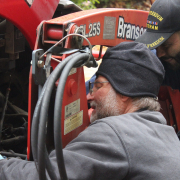
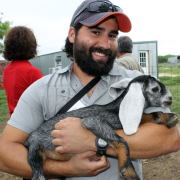

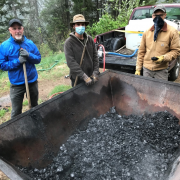 Courtesy
Courtesy
